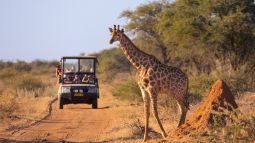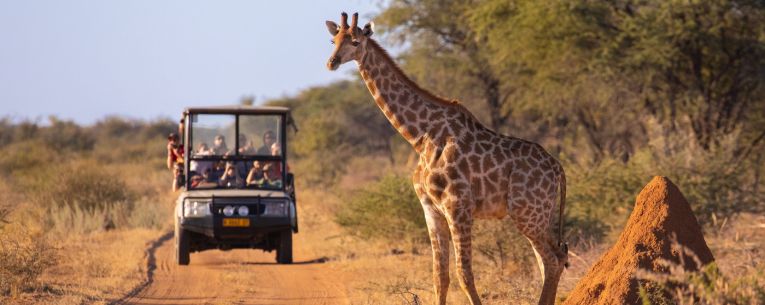An African safari is one of those trips that will change your life. Meditate on the nature of life and death as you watch the ancient dance of predator and prey play out across sweeping grasslands. Savor a gin-and-tonic as the setting sun sets the sky ablaze. Rise before dawn the next day and do it all again.
It’s a magical experience. But what is an a safari vacation actually like? Chances are, it’s a lot less strenuous (and more delicious) than you expect. Here’s our list of seven things that might take you by surprise.
1. Your experience will change dramatically depending on where you travel.
Searching for the single best safari destination? Honestly, there’s no such place. Every country has its own unique ecology, wildlife, and landscapes. South Africa is often named as the best spot for a first-time safari traveler, because its national parks and wildlife preserves are accessible and home to a variety of animals. Botswana’s refuges are more remote; to reach lodges in the vast Okavango Delta, you’ll have to fly in a tiny bush plane. Your reward is a true wilderness experience, without crowds of other tourists. Kenya and Tanzania are both known for migratory herds of wildebeest, zebra and other grazers, as well as pursuing predators. Namibia has far fewer animals, but its desert landscapes will be seared into your memory forever. If budget and time permit, you can combine multiple destinations into one grand tour.
2. It can be cold—really cold—on the game drives.
The best time to see a variety of animals in southern Africa — notably South Africa, Botswana and Namibia — is the dry season, May through September. This is winter in the southern hemisphere, and the temperature often dips into the 40s (Fahrenheit) in June and July. The air can be biting cold during early-morning game drives, just before the sun rises.
At most safari lodges and camps, a drum or trumpet will sound around 5 or 5:30 a.m. That means it’s time to roll out of bed, put on some warm clothes, and start your drive into the bush. Definitely bring a jacket, hat and gloves. Many lodges thoughtfully provide blankets and hot-water bottles for the drive, but even then you’ll get chilly. Expect to stop after a few hours for some hot coffee and muffins or rusks (a dry breakfast biscuit). The temperature will climb into the 80s or higher by midday… but it’ll drop rapidly during the evening drive.
3. You should bring more cash than you think you’ll need.
Tipping is customary at safari lodges to show gratitude for the hardworking staff. If you’re reluctant to tip, remember that the guides, trackers and staff typically spend weeks or even months at a time living at the lodge, away from their families. They wake early and stay up late to ensure that you’re comfortable and enjoying yourself. You won’t regret tipping generously, but you will regret skimping on tips because you’ve run out of cash.
Many lodges are in remote locations where visiting an ATM just isn’t possible. For this reason, you should calculate ahead of time how much money you’ll need and carry that amount, plus extra. US dollars are widely accepted and appreciated. General guidelines for tipping on safari (not every lodge will have all these staff positions):
- $10 per couple for the transfer driver (more if it’s a long drive)
- $15-20 per couple, per day for the lodge or camp staff (housekeeping, kitchen and administrative)
- $20 per couple, per day to the safari guide
- $15 per couple, per day to the tracker
- $15 per couple, per day to the camp butler
You may want to tip more if your guide and tracker are especially good (if they find an elusive animal just for you, for instance); if you’re traveling solo; if you’re staying at luxury lodges; or if staff go above and beyond.
4. Getting sick is not inevitable.
Many travelers assume that because they’re heading into wilder parts of Africa, it’s likely they’ll pick up a food-, water- or insect-borne illness. Not necessarily! Keep in mind that safari lodges cater exclusively to tourists, and so they work hard to ensure you stay well. It’s generally safe to eat salads and other fresh vegetables and fruits at the lodges. Staff will tell you if the water is safe to drink and/or brush your teeth with. If it’s not, filtered or bottled water will be provided.
To avoid getting sick on safari, prevention is key. Consult your doctor and/or a travel pharmacist before you go. They may prescribe malaria pills (which are taken before, during and after your trip), as well as a course of antibiotics to be taken if you get severe traveler’s diarrhea. Vaccinations, such as typhoid, tetanus and hepatitis A/B, may be recommended as well.
What if you do become seriously ill on your safari? That’s when your travel insurance plan can save the day. Emergency medical benefits and emergency transportation benefits can cover eligible costs of medical care and transportation for a sudden, unexpected illness, injury, or medical condition. It’s especially important to have this protection when you’re on safari; without it, you may be responsible for paying the enormous costs of a medical evacuation from a remote lodge to the nearest advanced medical facility. Need insurance? Get a quote.
5. Safari vacations are sedentary.
If you’re an active traveler, you probably picture yourself striding through the bush in pursuit of giraffes and rhinos. The truth is, you’ll be sitting down almost all of the time. A typical safari camp schedule looks like this:
- 5:30-8:30 a.m.: Morning game drive
- 9-10 a.m.: Big breakfast
- 10 a.m.-1 p.m.: Downtime
- 1-2 p.m.: Lavish lunch
- 3-6 p.m.: Evening game drive with sundowner cocktails
- 7-8 p.m.: Delectable dinner
Some lodges offer bush walks, but these are typically short, educational strolls with a guide—not strenuous hikes. Do not leave the camp to walk on your own. This is dangerous and strictly prohibited. If it’s important to you to stay active on your safari trip, choose a lodge that offers yoga or other fitness classes, or plan some DIY exercises you can do on your own.
6. Safari vehicles may outnumber the animals.
Safari guides collaborate to track down the animals tourists most want to see. The moment one guide spots a pack of African wild dogs or a pride of lions gnawing on a zebra’s carcass, many more safari vehicles converge on that spot. In a matter of minutes, the animals may be surrounded.
“The problem, which conservationists describe as ‘aggressive tourism,’ preceded the pandemic, but it appears to have gotten worse, with guests hungry for Instagram moments and tour companies trying to make up for the losses they suffered when the world shut down,” The New York Times recently reported.1
Remember: As a tourist, you have power. Ask your guide to keep a respectful distance from the animals, and don’t linger too long. Use binoculars to get a better view. Opt to stay in private reserves, where the number of vehicles is much smaller than on public lands. If you encounter safari companies harassing animals, report it.
7. There’s so much more to see than just the “Big Five.”
Many tourists bring a checklist mentality to their safari vacation. They’re intent on spotting—and snapping photos of—the famed “big five” game: elephant, rhino, lion, leopard and buffalo.
It’s natural to want to see these magnificent animals, but there’s so much more wildlife to observe! In southern Africa, for instance, birds are incredibly varied and abundant. You can see magnificent eagles and other raptors, jewel-like bee-eaters, curious hornbills and more. You may spot small animals, such as chameleons, mongooses and bush babies. Even the termite mounds that dot the landscape are architectural wonders. Ask your guide to describe how the insects construct sophisticated, temperature-controlled, multi-chambered rooms and grow their underground fungal gardens.
Considering a safari vacation next year? Here’s one last tip: Buy travel insurance as soon as you pay your first trip deposit. That way, you can maximize your coverage window and your protection against common travel challenges.
One of our most popular travel insurance plans for safaris and other international vacations is OneTrip Prime, which provides a wide array of benefits with high maximum limits. Best of all, kids 17 and under are covered for free when traveling with a parent or grandparent (not available on policies issued to Pennsylvania residents). Get a quote.
Related Articles








Share this Page